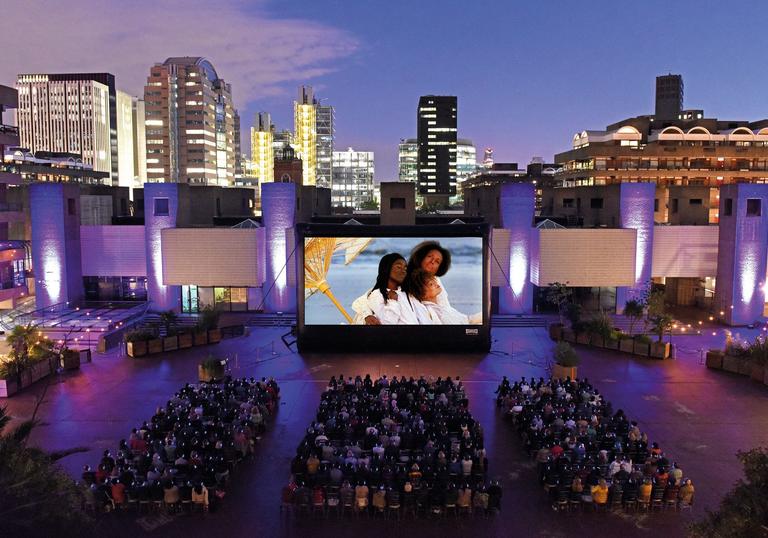Press room
Outdoor Cinema Screenings at the Barbican celebrate our connection to the natural world

Barbican Outdoor Cinema Screening, photography credit Justin Piperger
Tue 23 Aug – Sun 28 Aug 2022
Barbican Sculpture Court
https://www.barbican.org.uk/whats-on/series/outdoor-cinema
Following last year’s successful series, Barbican Cinema is delighted to again present a late summer programme of evening open-air screenings, bringing together all the Barbican art forms – cinema, music, theatre, dance and visual art – set against the spectacular architectural backdrop of the Barbican Sculpture Court.
This year’s Outdoor Cinema programme compliments Our Time On Earth –Barbican’s major exhibition celebrating the power of global creativity to reignite respect and inspire awe and wonder for our beautiful planet – with stunning films which celebrate our connection to the natural world.
The programme kicks off with the iconic concert film Pink Floyd Live at Pompeii, which sees the legendary rock group playfully subvert the genre, by performing at the famed amphitheatre located among the ruins of Pompeii. Playing to almost no audience, save for a limited film crew, the film is an unexpected and alluring visual experience, as the camera lingers on the vast, empty landscapes of Pompeii. Made circa 1972, the film gives an almost mythical snapshot of Pink Floyd at the height of their fame and influence, as they cycle through some of their most famed tracks of the time such as "Echoes, Part 1” "Careful with That Axe, Eugene” and "A Saucerful of Secrets".
Two celebrated films from two iconic Japanese production companies, Toho and Studio Ghibli, remind us of the mystical power of nature over humans.
One of the most eternally popular and iconic characters from the legendary Japanese film production company Toho, Mothra has been a staple across the kaiju (giant monster) genre. Before she teamed up with Godzilla, Rodan and other kaiju superstars, Mothra made an unforgettable, vibrant debut in Ishirō Honda’s hugely enjoyable monster movie. Mayhem ensues when her two miniature priestesses (Emi and Yumi Itō, better known by their stage name, The Peanuts), are kidnapped from their tropical island home by greedy capitalists from the land of Rolisica (a thinly veiled parody of the USA).
An epic battle between animals and humans is the backdrop of Studio Ghibli’s stunning fantasy Princess Mononoke, which established Japanese director Hayao Miyazaki’s as a master of animation. Prince Ashitaka, a young warrior, becomes cursed by a demon and seeks a cure, encountering the mysterious princess San and ending up in the midst of an epic war between forest spirits and humans. An epic quest to restore the natural balance unfolds, told through some of the most beautiful animation ever seen on the big screen. The screening here anticipates the arrival of RSC’s production of Studio Ghibli’s My Neighbour Totoro on Barbican Theatre’s stage in the autumn.
Continuing the theme, the Friday-night Outdoor Cinema treat is a double-bill featuring the wildly imaginative, wonderfully detailed work of celebrated French animator René Laloux. His visually stunning animated fantasy film, La Planète Sauvage centres around the struggles between humans and a series of extra-terrestrial creatures, which inhabit the beautifully illustrated titular planet. Other worldly landscapes populated by strange phallic creatures across wild, brightly coloured planets are heightened by a haunting score made up of psychedelic jazz-funk courtesy of composer, and frequent Serge Gainsbourg collaborator, Alain Goraguer. Also, screening is Les escargot, a beautifully crafted fable centring on a farmer trying to fertilise his crops and the dramatic consequences of his unconventional methods.
In a world of disappearing sea ice, Figuring Bodies of Water is a curated evening of work by contemporary artists and filmmakers including Susan Schuppli, Anne Duk Hee Jordan and Jean Painlevé, among others. These watery, visually curious films explore ideas around queer ecologies and investigate how hermaphroditic, transgender, and gender-swapping examples of aquatic life are constantly shifting sexual gears to adapt to human environmental irresponsibility.
And closing this year’s Outdoor Cinema, is Julie Dash’s seductive, lyrical Daughters of the Dust, shown here in a recent 2K restoration. Aside from the film’s lush visuals courtesy of celebrated cinematographer and artist Arthur Jafa, Daughters of the Dust is also notable for being the first film directed by a Black woman to receive nationwide distribution to American theatres, which then played to packed houses for four months in New York. This classic, 1991 magic realist drama tells the story of a Black Southern family through a focus on the multi-generational female relationships and how African traditions and mythology contribute to the creation and maintenance of their community. The film is one of immense importance and influence, most notably inspiring the visual aesthetic of Beyonce’s Lemonade.
Gali Gold, Head of Barbican Cinema comments:
“It’s a joy to bring together the Barbican’s art forms with this year’s outdoor programme of magical, creative and environmentally sensitive films. The experience of watching a film in the Barbican’s own amphitheatre, the Sculpture Court, is like no other, and these films will gain a unique value, watched within our urban outdoor.”
LISTINGS
All screenings take place on Barbican Sculpture Court.
Tue 23 Aug, 8.30pm
Pink Floyd Live at Pompeii (U)
Belgium, West Germany, France, 1972, Dir Adrian Maben, 92 min
Wed 24 Aug, 8.30 pm
Mothra (PG)
Japan 1962, Dir Ishirô Honda, 101mins
Thu 25 Aug, 8.30 pm
Figuring Bodies of Water (PG)
Dirs Various, 95mins
Fri 26 Aug, 8.30 pm
La Planète Sauvage (PG)
France, Czech Republic 1973, Dir René Laloux, 72 min
plus
Les escargots
France, 1965, Dir René Laloux, 11 mins
Sat 27 Aug, 8.30 pm
Princess Mononoke (PG)
Japan 1997, Dir Hayao Miyazaki, 133 min
Sun 298 Aug 2021, 8.30 pm, Daughters of the Dust (PG)
US 1991, Dir Julie Dash, 112 min
Ian Cuthbert, Communications Manager - Cinema : [email protected]
Sarah Harvey, Barbican Cinema Press Consultant: [email protected]
